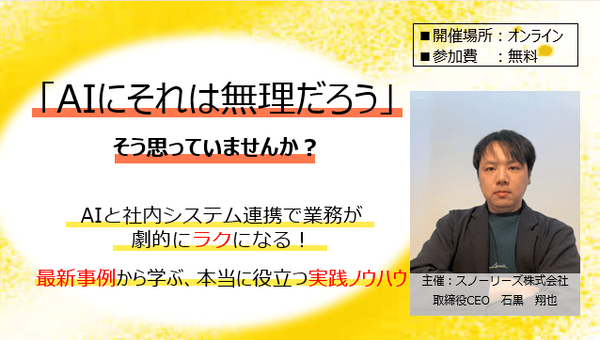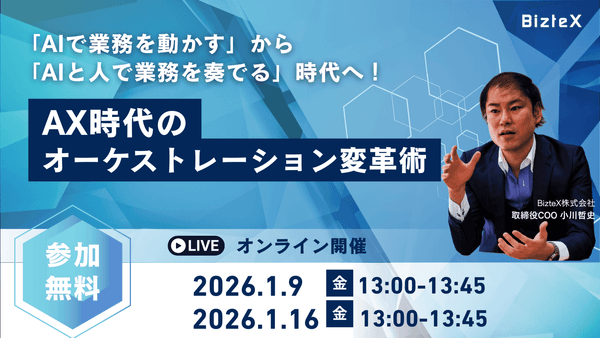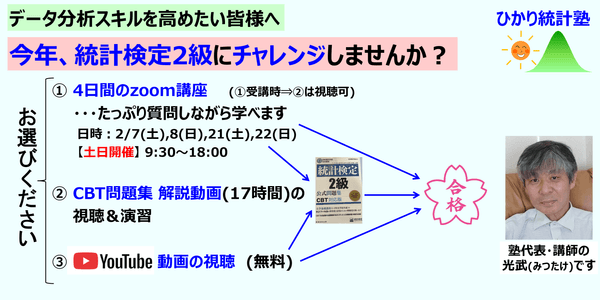eAIプロジェクトキックオフシンポジウム(オンライン)
イベント内容
国立情報学研究所、東京工業大学、および5つの機関が連携し、 JST未来社会創造事業の支援により機械学習応用システムを工学的に開発可能にする Engineerable AI (愛称:eAI) という研究開発プロジェクトを立ち上げております。 本プロジェクトのキックオフシンポジウムを開催いたします。 国内外の有識者による貴重な講演、パネル討論がありますので ぜひご参加いただければと思います。
お知らせ
- オンラインでの開催となります。
- 講演は日本語で行います。パネルディスカッションのみ英語になります。ただし、英語部分に関してはZoomの字幕機能を利用頂ける予定です。
- 6/8:プログラムを公開しました。
日程
2021年6月28日(月) 13:00-17:00(開場 12:50), 交流会:17:15-18:15
プログラム
13:00-13:05 挨拶:JST 未来社会創造事業 「超スマート社会の実現」領域 前田章 統括,鷲尾 隆 テーママネージャ(大阪大学 産業科学研究所・教授)
13:05-13:45 基調講演: New Hope of MLOps: Driving change that matters for our society
 講演者: 工藤卓哉 氏(Partner, Leader of Digital - Analytics, Mckinsey & Company)
講演者: 工藤卓哉 氏(Partner, Leader of Digital - Analytics, Mckinsey & Company)
略歴: Taku is a former Director of Statistical Analysis with the NYC Department of Education in the United States. He also served as the Chief Science Officer for one of the major Mobile Network Operators. Ex-Global Leader of Digital, Data Science. He owned several U.S. Patents, published six books and a variety of academic papers and articles. He earned B.A from Keio University, M.P.A from Columbia University and M.S. from Carnegie Mellon University.
13:45-14:15 招待講演: 企業におけるAIシステムの品質の考え方とその技術開発
 講演者:上原忠弘 氏(富士通株式会社 研究本部 人工知能研究所 シニアディレクター)
講演者:上原忠弘 氏(富士通株式会社 研究本部 人工知能研究所 シニアディレクター)
概要:機械学習技術の劇的な進展により様々なシステムにAIが組み込まれ始めるなか、AIシステムのライフサイクルを通じて品質を体系的にマネジメントする枠組の整備が急務である。本講演では、AIシステムに求められる品質をベンダー視点から俯瞰した上で、我々が重要と考えるシステム運用を起点とした品質確保に関する研究開発を紹介するとともに、Engineerable AI プロジェクトに対する期待を述べる。
略歴:1993年東京工業大学理工学部制御工学科卒業. 1995年同大学大学院総合理工学研究科知能システム科学専攻修士課程修了. 同年(株)富士通研究所入社. 以来, 業務システム開発をターゲットに, ソフトウェア開発方法論, ソフトウェアテスト, 形式手法, ソフトウェアアーキテクチャに関する研究開発に従事.
14:15-14:30 eAIプロジェクト紹介: 石川冬樹代表(NII)
14:30-14:40 休憩
14:40-15:15 eAIプロジェクトチーム(1) 医療POC × AI構築技術
・鈴木賢治 医療POCリーダー(東京工業大学 教授)
・松原崇(大阪大学 准教授)
・陣崎雅弘(慶應義塾大学 教授)
・三宅基隆(国立がん研究センター 医長)
15:15-15:50 eAIプロジェクトチーム(2) 交通POC × AI継続改善技術
・石川冬樹 交通POCリーダー(国立情報学研究所 准教授)
・馬雷(九州大学 フェロー,アルバータ大学 准教授/カナダ CIFAR AI チェア)
・鷲崎弘宜(早稲田大学 教授)
15:50-16:00 休憩
16:00-17:00 A panel discussion: Has machine learning matured enough as an "Engineering"?
Abstract: An engineering discipline, as in civil engineering and mechanical engineering, is to build a body of knowledge for designing, constructing, and maintaining structures and/or contraptions to be trusted and used by society. Machine learning is a new technology with a huge potential to change the way we interact with the world but has challenges such as quality, safety, and fairness before widely being accepted by society. We would like to ask each panellist to answer the question with "yes" or "no" with reasons and discuss how we as the community of Machine Learning Systems Engineering proceed to become a truly trusted engineering discipline.
Chair: Nobukazu Yoshioka (Senior Researcher/Professor, Waseda University)
 Facilitator: Hiroshi Maruyama (PFN Fellow at Preferred Networks, Inc. / Executive Fellow at Kao corp.)
Facilitator: Hiroshi Maruyama (PFN Fellow at Preferred Networks, Inc. / Executive Fellow at Kao corp.)
Dr. Hiroshi Maruyama has spent 26 years in IBM Research, Tokyo Research Laboratory, working on various computer science areas such as artificial intelligence, natural language processing, machine translation, hand-writing recognition, multimedia, XML, Web Services, and security. He was the director of IBM Tokyo Research Laboratory from 2006 to 2009. From 2011 to 2016, he was a professor at the Institute of Statistical Mathematics where he worked on projects related to big data, statistics, and their impacts on society. He joined Preferred Networks, Inc. in April 2016 as the chief strategy officer. He has been appointed Executive Fellow at Kao Corporation in 2020. His current research interests include practical applications of machine learning, social implications of information technology and machine learning, and computer science and statistics in general. Currently, he is a PFN Fellow at Preferred Networks, Inc., an Executive Fellow at Kao Corp. and a project professor at the Research into Artifacts, Center for Engineering at the University of Tokyo.
Panellists:
- Bashar Nuseibeh(Professor, The Open University, UK/Lero, Ireland)
- Foutse Khomh(Professor, Polytechnique Montreal, Canada)
- Zhi Jin(Professor, Peking University, China)
- Takuya Kudo (Partner, Leader of Digital - Analytics, Mckinsey & Company, USA)
- Fuyuki Ishikawa (Associate Professor, NII, Japan)
- Kenji Suzuki (Professor, Tokyo Institute of Technology, Japan)
17:15-18:15 交流会(SpatialChatを予定)
パネリスト
Bashar Nuseibeh (Professor at The Open University in UK and Lero in Ireland)
 Bashar Nuseibeh is a Professor of Software Engineering at the University of Limerick and is the centre's Chief Scientist. His research interests are in software requirements and design; security, privacy, and digital forensics; and the engineering of autonomous and adaptive systems. He leads the SPARE research group in Lero. He was Director of Research in Computing at The Open University (OU), where he continues serve as head of its software engineering and design research group. He was a Visiting Professor at Imperial College London, and is currently an Honorary Professor at University College London and a Visiting Professor at the National Institute of Informatics (NII), Tokyo, Japan.
Bashar Nuseibeh is a Professor of Software Engineering at the University of Limerick and is the centre's Chief Scientist. His research interests are in software requirements and design; security, privacy, and digital forensics; and the engineering of autonomous and adaptive systems. He leads the SPARE research group in Lero. He was Director of Research in Computing at The Open University (OU), where he continues serve as head of its software engineering and design research group. He was a Visiting Professor at Imperial College London, and is currently an Honorary Professor at University College London and a Visiting Professor at the National Institute of Informatics (NII), Tokyo, Japan.
Foutse Khomh (Professor at Polytechnique Montreal in Canada)
 Foutse Khomh is a Professor of Software Engineering at Polytechnique Montreal (Canada) where he leads the SWAT Lab. on software analytics, machine learning systems engineering, and cloud engineering research. He is also FRQ-IVADO Research Chair on Software Quality Assurance for Machine Learning Applications and Academic Associate Member at MILA. Prior to these positions, He was a Research Fellow at Queen's University (Canada), working with the Software Reengineering Research Group and the NSERC/RIM Industrial Research Chair in Software Engineering of Ultra Large Scale Systems. He received a Ph.D in Computer Science from the University of Montreal, under the supervision of Yann-Gael Gueheneuc, with the Award of Excellence. He also received a CS-Can/Info-Can Outstanding Young Computer Science Researcher Prize for 2019. His research interests include software maintenance and evolution, cloud engineering, service-centric software engineering, empirical software engineering, and software analytics.
Foutse Khomh is a Professor of Software Engineering at Polytechnique Montreal (Canada) where he leads the SWAT Lab. on software analytics, machine learning systems engineering, and cloud engineering research. He is also FRQ-IVADO Research Chair on Software Quality Assurance for Machine Learning Applications and Academic Associate Member at MILA. Prior to these positions, He was a Research Fellow at Queen's University (Canada), working with the Software Reengineering Research Group and the NSERC/RIM Industrial Research Chair in Software Engineering of Ultra Large Scale Systems. He received a Ph.D in Computer Science from the University of Montreal, under the supervision of Yann-Gael Gueheneuc, with the Award of Excellence. He also received a CS-Can/Info-Can Outstanding Young Computer Science Researcher Prize for 2019. His research interests include software maintenance and evolution, cloud engineering, service-centric software engineering, empirical software engineering, and software analytics.
Zhi Jin(Professor at Peking University in China)
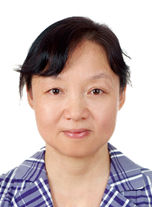 Jin, Zhi is a professor in the Department of Computer Science and technology, School of EECS, Peking University in China and serves as the Deputy Director of High-Confidence Software Technologies at Ministry of Education of China since 2009. She obtained her BSc from Zhejiang University in 1984, and Ph.D. from National University of Defense Technology in 1992 respectively. Her research interests include knowledge engineering, requirements engineering and knowledge-based software engineering.
She has been a winner for several national-wide awards in China because of her outstanding research achievements. She has attracted and leads over 20 national competitive grants which include the Premier’s Award of Distinguished Young Scientists in China awarded by the National Natural Science Foundation of China in 2006. She was the First Chief Investigator for three national-level projects and two bilateral collaboration international projects. She is now the chief-scientist of a national basic research program in China. She has published two monographs, over 40 peer-reviewed journal papers and 60 international conference papers.
Jin, Zhi is a professor in the Department of Computer Science and technology, School of EECS, Peking University in China and serves as the Deputy Director of High-Confidence Software Technologies at Ministry of Education of China since 2009. She obtained her BSc from Zhejiang University in 1984, and Ph.D. from National University of Defense Technology in 1992 respectively. Her research interests include knowledge engineering, requirements engineering and knowledge-based software engineering.
She has been a winner for several national-wide awards in China because of her outstanding research achievements. She has attracted and leads over 20 national competitive grants which include the Premier’s Award of Distinguished Young Scientists in China awarded by the National Natural Science Foundation of China in 2006. She was the First Chief Investigator for three national-level projects and two bilateral collaboration international projects. She is now the chief-scientist of a national basic research program in China. She has published two monographs, over 40 peer-reviewed journal papers and 60 international conference papers.
Kenji Suzuki (Professor at Tokyo Institute of Technology)
 Kenji Suzuki, Ph.D. is a Professor & Director at Biomedical AI Research Unit, Institute of Innovative Research, Tokyo Institute of Technology, Japan. Prior faculty experiences include Assistant Professor at University of Chicago and Associate Professor at Illinois Institute of Technology. He published more than 340 papers (including 115 peer-reviewed journal papers). He has been actively researching on machine & deep learning in medical imaging and AI-aided diagnosis in the past 25 years, especially his early deep-learning model was proposed in early 1990s. His papers were cited 13,000 times, and his h-index is 53. He is inventor on 36 patents (including ones of earliest deep-learning patents), which were licensed to several companies and commercialized (via FDA approval). He published 14 books and edited 12 journal special issues. He has been awarded numerous grants including NIH, NEDO, and JST grants. He served as Editors of 40 leading international journals including Pattern Recognition. He chaired 100 international conferences and gave 130 keynote/invited talks. He received 21 awards, including 3 Best Paper Awards in leading journals and MEXT Award for Science and Technology.
Kenji Suzuki, Ph.D. is a Professor & Director at Biomedical AI Research Unit, Institute of Innovative Research, Tokyo Institute of Technology, Japan. Prior faculty experiences include Assistant Professor at University of Chicago and Associate Professor at Illinois Institute of Technology. He published more than 340 papers (including 115 peer-reviewed journal papers). He has been actively researching on machine & deep learning in medical imaging and AI-aided diagnosis in the past 25 years, especially his early deep-learning model was proposed in early 1990s. His papers were cited 13,000 times, and his h-index is 53. He is inventor on 36 patents (including ones of earliest deep-learning patents), which were licensed to several companies and commercialized (via FDA approval). He published 14 books and edited 12 journal special issues. He has been awarded numerous grants including NIH, NEDO, and JST grants. He served as Editors of 40 leading international journals including Pattern Recognition. He chaired 100 international conferences and gave 130 keynote/invited talks. He received 21 awards, including 3 Best Paper Awards in leading journals and MEXT Award for Science and Technology.
eAIプロジェクトメンバーご紹介
 eAI代表/交通POCリーダー: 石川冬樹 (国立情報学研究所 准教授)
eAI代表/交通POCリーダー: 石川冬樹 (国立情報学研究所 准教授)
国立情報学研究所 アーキテクチャ科学研究系 准教授、および先端ソフトウェア工学・国際研究センター 副センター長。電気通信大学 情報理工学研究科 客員准教授兼任。ソフトウェア工学および自律・スマートシステムに関する研究、特にディペンダビリティに関する研究に従事。2020年 IPSJ/IEEE Computer Society Young Researcher Award 受賞。日本ソフトウェア科学会 機械学習工学研究会 主査、AIプロダクト品質保証コンソーシアム(QA4AI) 副運営委員長。
 医療POCリーダー/東京工業大学代表: 鈴木賢治 (東京工業大学 教授)
医療POCリーダー/東京工業大学代表: 鈴木賢治 (東京工業大学 教授)
米国シカゴ大医用物理学研究科助教授、イリノイ工科大医用画像研究所准教授を経て、現在、東京工業大学科学技術創成研究院教授。近年話題の深層学習と同様の手法を1990年代半ばに発明、深層学習による画像処理を開発、その後汎用的なモデルによりAI支援診断システムの性能を飛躍的に向上させ、FDA・薬事承認を経た社会実装に成功した。国際ジャーナル論文115編、教科書14編を出版、論文被引用回数は13,000以上、h-indexは53である。特許36件を米国・日本で出願、NIH、NEDO、JSTなどの大型研究費を獲得、50以上の国際論文誌編集委員、100の国際会議大会長を歴任した。国際会議発表賞5件、国際ジャーナル論文賞3件を含む20件の国際賞、文部科学大臣科学技術賞を受賞した。
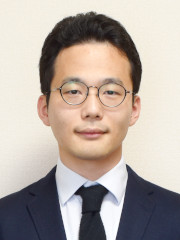 大阪大学代表: 松原崇(大阪大学 准教授)
大阪大学代表: 松原崇(大阪大学 准教授)
2015年に大阪大学にて博士(工学)を取得後,神戸大学 助教を経て現職.機械学習の柔軟さと数理モデルの厳密さを両立させるような,データ駆動型のモデル化の研究に従事.
 慶應義塾大学代表: 陣崎雅弘(慶應義塾大学 教授)
慶應義塾大学代表: 陣崎雅弘(慶應義塾大学 教授)
 国立がん研究センター代表: 三宅基隆(国立がん研究センター 医長)
国立がん研究センター代表: 三宅基隆(国立がん研究センター 医長)
国立がん研究センター中央病院放射線診断科医長.医学博士.放射線診断専門医 .国立がん研究センター中央病院放射線診断科レジデント,がん専門修練医, 神戸大学医学部放射線科助教,国立がん研究センター中央病院放射線診断科医員を経て現在に至る .日本放射線科専門医会・医会,理事長特別補佐.国立がん研究センター研究所と中央病院におけるメディカルAIプロジェクトに参画.医用画像を起点とした医師参加型人工知能開発のためのロジスティクスに関心を持ち,日々の臨床業務,研究開発に従事している.
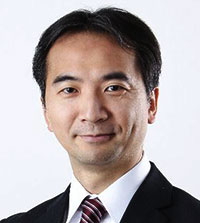 早稲田大学代表: 鷲崎弘宜(早稲田大学 教授)
早稲田大学代表: 鷲崎弘宜(早稲田大学 教授)
早稲田大学 研究推進部 副部長、早稲田大学グローバルソフトウェアエンジニアリング研究所所長・情報理工学科教授、国立情報学研究所客員教授、株式会社システム情報 取締役(監査等委員)、株式会社エクスモーション 社外取締役。IEEE Computer Society副会長、ISO/IEC/JTC1 SC7/WG20 Convenor、情報処理学会ソフトウエア工学研究会 主査、JST CREST信頼されるAIシステム 領域アドバイザ、enPiT-Proスマートエスイー 事業責任者、ソフトウェアエンジニアリングシンポジウム SES2021実行委員長。設計・再利用や品質保証を中心としたソフトウェア工学、機械学習デザインパターンや要求工学・モデリングを中心とした機械学習工学の研究、教育、社会実装に従事。
 九州大学代表: 馬雷(九州大学 フェロー,アルバータ大学 准教授/カナダ CIFAR AI チェア)
九州大学代表: 馬雷(九州大学 フェロー,アルバータ大学 准教授/カナダ CIFAR AI チェア)
アルバータ大学マシンインテリジェンス研究所に所属しカナダ CIFAR AIチェアとしてAI研究に従事するとともに、九州大学システム情報科学研究院情報知能工学専攻 フェローとして、高度ソフトウェア工学研究室を趙教授とともに率いている。上海交通大学卒業後、東京大学にて修士および博士号を取得。ソフトウェア工学と信頼できるAIとの融合領域、特に、機械学習とAIシステムの品質と信頼性に関心を持つ。彼の研究は、SE, ICSE, FSE, ASE, ISSTA, ICML, NeurIPS, ACM MM, AAAI, IJCAI, ECCV, CAVなど、ソフトウェア工学やAI分野のトップ会議に多数採録され、3つのACM SIGSOFT Distinguished Paper Awardの他、10以上のベストペーパ賞を受賞。産業界にも多大な影響を及ぼしている。詳しい情報は、Webサイトを参照のこと。
協賛
- スマートエスイー : スマートシステム&サービス技術の産学連携イノベーティブ人材育成
- JSSST 機械学習工学研究会(MLSE)
- IEEE CS Tokyo/Japan Joint Chapter, Fukuoka Chapter, Kansai Chapter
プロジェクトWebサイト
問い合わせ
eAI事務局 contact [a] engineerable.ai
注意事項
※ 掲載タイミングや更新頻度によっては、情報提供元ページの内容と差異が発生しますので予めご了承ください。
※ 最新情報の確認や参加申込手続き、イベントに関するお問い合わせ等は情報提供元ページにてお願いします。
新規会員登録
このイベントに申し込むには会員登録が必要です。
アカウント登録済みの方はログインしてください。
※ ソーシャルアカウントで登録するとログインが簡単に行えます。
※ 連携したソーシャルアカウントは、会員登録完了後にいつでも変更できます。


